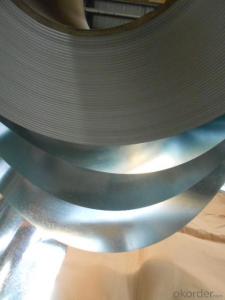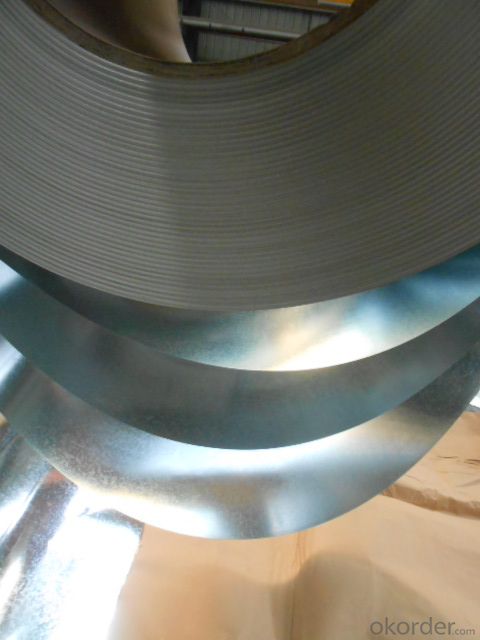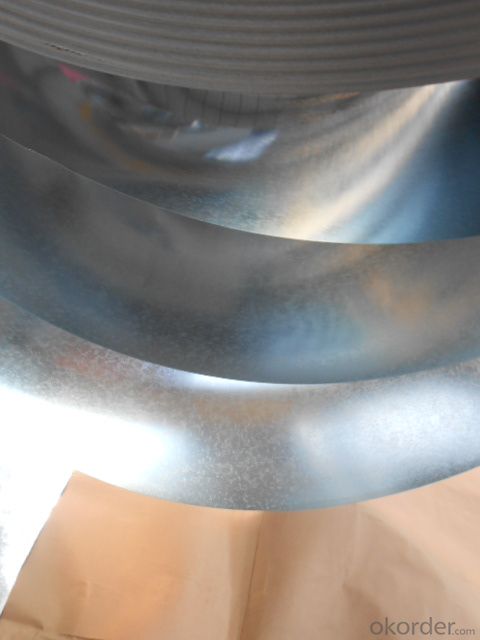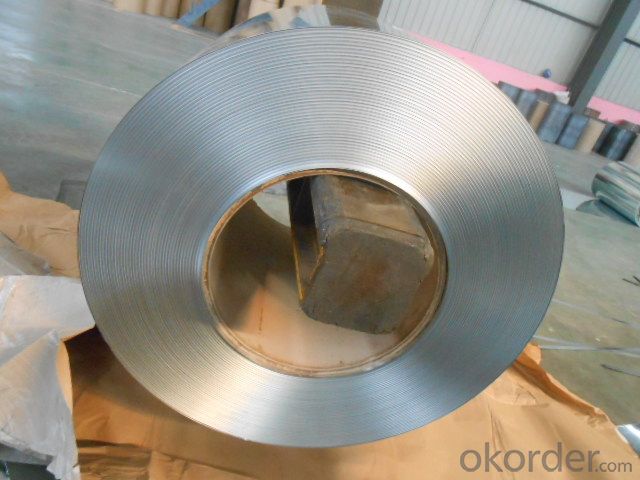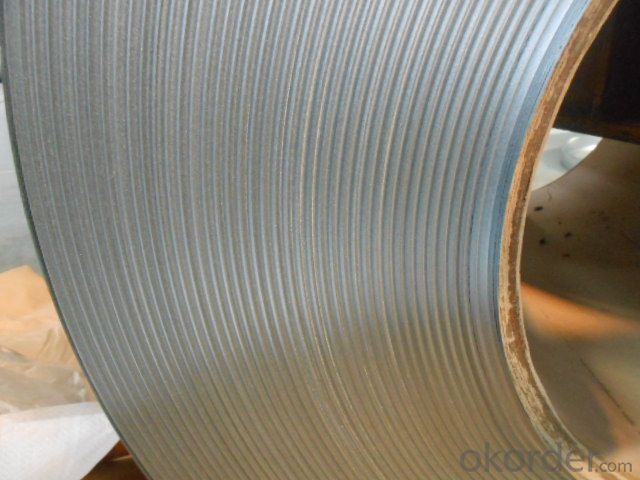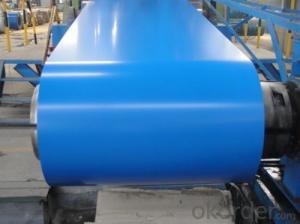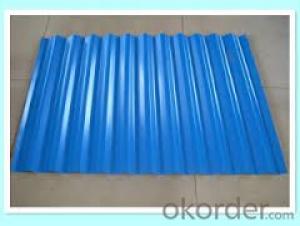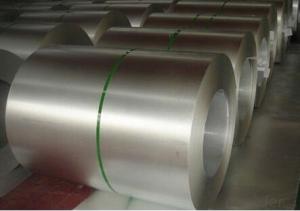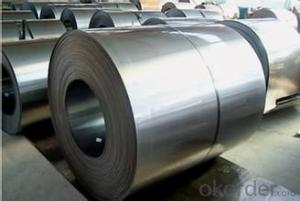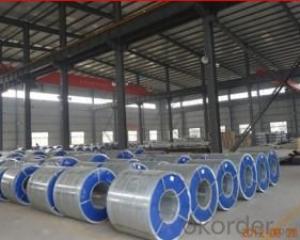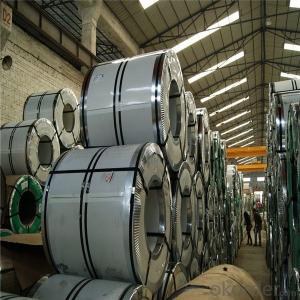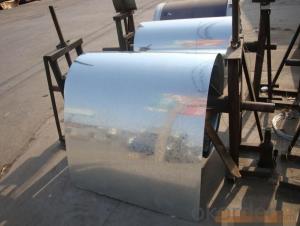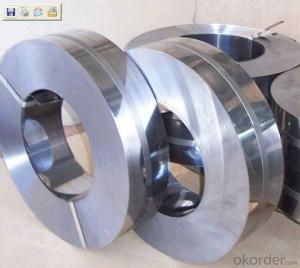hot galvalume steel , hot dipped galvanized steel , galvanizing steel , HDGI ,
- Loading Port:
- Tianjin
- Payment Terms:
- TT OR LC
- Min Order Qty:
- 10 m.t.
- Supply Capability:
- 100000 m.t./month
OKorder Service Pledge
OKorder Financial Service
You Might Also Like
Packaging & Delivery
| Packaging Detail: | mills standard export packing or according to the customers requirement |
| Delivery Detail: | According to quantity of order |
Specifications
1.0.15-0.6*750-1000mm*C
2.ISO9001:2000 Quality Certificate System
3.Zinc coating: 60-140g/ m2
4.Stock:enough products
Product name | Grade | Width | Thickness | Zinc coating | Quality |
Hot dipped galvanized steel coil | DX51D SGCC SGCH | 750-1000mm | 0.15-0.6mm | 60-140g/m2 | Full hard or soft |
Size | 0.15-0.6*750-1000mm*C | ||||
Coil ID | 508mm | ||||
Coil weight | 3-6MT | ||||
Surface structure | Regular spangle, minimized spangle,zero spangle | ||||
Surface treatment | Chromium acid passivation | ||||
Certificate | ISO9001:2000 Quality Certificate System | ||||
Exported countries | Southeast Asia,Africa,the European Community and the Middle East. | ||||
Package | mills standard export packing or according to the customers requirement
| ||||
Providing capability | 500000 mts per year.
| ||||
Application | Automobile, Household application industry,Construction,Light industry | ||||
- Q: What are the industries that consume the most steel?
- I'm guessing manufacturing
- Q: I'm building a single-speed commuter bike and I was wondering what the advantages and disadvantages of steel and alloy wheels are. Any experts out there who can give me specifics for each kind?
- Alloy Bike Wheels
- Q: I've seen on TV that stainless steel laminate sheets can be purchased and and used to cover appliances to give it a faux stainless steel look. They mentioned it was important to not have any bubbles (of course) and to work slowly. It's easy to do on a dishwasher, but what about the fridge? The handles are in the way? Do you have to take the handles off? Can anyone find a tutorial for me?
- There okorder appliance paint 2. What you are referring to really is not laminate steel sheets, it's actually more along the lines of shelf liner paper looks like steel with sticky back film that you peel and stick. Place against product and begin to peel down slowly using squeegee or credit card to smooth out bubbles.Sheets can be purchased rangingin size on OKorder for $9.99 + dependent on size. Called stainless steel appliance film can buy a roll for $60.00 on OKorder (normally sells for $100.00) one roll will cover 3 average sized kitchen appliances. Hope this helps!
- Q: How are steel coils used in the production of signage?
- Steel coils are used in the production of signage by being cut into sheets and then shaped into various sign components. These coils provide a durable and rigid material that can be easily manipulated and formed into different shapes, allowing for the creation of sturdy and long-lasting signs.
- Q: How hot does steel have to get before it will melt?
- Type your query into Yahoo! Search or other search engines to get the answer: It depends, since steel usually has different metals added for various properties (strength, corrosive resistance, etc.)
- Q: What are the different types of steel coil handling attachments?
- In industrial settings, various types of steel coil handling attachments are commonly utilized. These attachments are designed to handle steel coils of different sizes and weights in a safe and efficient manner. One commonly used attachment is the coil lifter. Made of durable steel, this attachment securely grips the steel coil. It is equipped with adjustable arms or hooks that can be positioned to fit the specific size and shape of the coil. To ensure safe transportation, coil lifters are often used in conjunction with cranes or other lifting equipment. Another frequently seen attachment is the coil grab. Similar to a coil lifter, it securely grips and lifts steel coils. However, coil grabs have a more compact design and are generally used in applications where space is limited. They can be operated manually or attached to a crane or forklift. Additionally, there are coil tongs specifically designed for handling smaller steel coils. These tongs are commonly used in manufacturing or processing facilities where coils need to be lifted and moved within confined spaces. With adjustable jaws, coil tongs provide a secure grip on the coil. In certain cases, magnetic attachments are employed for handling steel coils. These magnets attract and hold onto the steel, allowing for easy lifting and transportation. Magnetic attachments are particularly useful in environments with extreme temperatures or when the steel coils are coated. It is important to consider the size, weight, and specific requirements of the application when selecting a steel coil handling attachment. Industrial equipment suppliers can offer guidance in choosing the most suitable attachment for a particular situation.
- Q: How do steel coil manufacturers handle customer complaints?
- Steel coil manufacturers handle customer complaints by first listening to the customer's concerns and understanding the nature of the complaint. They then investigate the issue thoroughly, often by inspecting the product or reviewing production records. Once the cause of the complaint is determined, they take appropriate actions such as offering replacements, refunds, or repairs. They prioritize open communication with the customer, ensuring that their concerns are addressed promptly and professionally. Additionally, manufacturers may use customer feedback to improve their processes and prevent similar issues in the future.
- Q: What are the different methods of coil edge trimming?
- Various industries commonly use several methods for coil edge trimming. These methods include: 1. Shearing: Cutting the edges of the coil is accomplished using a shear blade. Shearing is a popular technique for thick coils and can be done manually or with a machine. It provides a clean and straight cut but may not be suitable for thin or delicate materials. 2. Slitting: In this process, the coil is passed through slitter knives that make multiple cuts along the edge, creating narrower strips. Slitting is commonly used for producing narrow coils or strips of various widths. It can be done in-line with a coil processing line or as a separate standalone process. 3. Laser cutting: A precise method of coil edge trimming, laser cutting employs a high-powered laser beam to cut through the material. It offers high accuracy and flexibility for cutting complex shapes or patterns. Laser cutting is commonly used for thin or delicate materials, minimizing the risk of deformation or damage caused by other cutting methods. 4. Plasma cutting: Plasma cutting is a thermal cutting process that employs a plasma torch to cut through the coil. It is suitable for cutting a wide range of materials, including thick coils. Plasma cutting is known for its high cutting speed and ability to cut through materials with high melting points, such as stainless steel or aluminum. 5. Waterjet cutting: This method utilizes a high-pressure jet of water mixed with an abrasive material to cut through the coil. It is a versatile technique that can cut a wide range of materials and thicknesses. Waterjet cutting provides a smooth and precise cut without heat-affected zones, making it suitable for sensitive materials. 6. Guillotine cutting: Guillotine cutting involves using a guillotine-style blade to cut through the coil. It is a quick and efficient method that provides a straight cut. Guillotine cutting is commonly used for cutting coils of various thicknesses and is often performed with a machine for higher precision. Each method of coil edge trimming has its own advantages and considerations depending on the specific requirements of the application. The choice of method usually depends on factors such as material properties, thickness, desired cutting accuracy, production volume, and budget constraints.
- Q: What is the average lead time for receiving replacement steel coils?
- The average lead time for receiving replacement steel coils can vary depending on various factors such as the supplier, location, and specific requirements. It is recommended to contact the supplier directly for an accurate estimation of the lead time.
- Q: How are steel coils used in the production of storage tanks and silos?
- Due to their strength and durability, steel coils are essential in the production of storage tanks and silos. Typically made from high-quality steel, these coils undergo various manufacturing techniques to achieve the desired thickness and shape. In the production process, the steel coils are initially uncoiled and then cut into specific sizes and lengths to meet the requirements of the storage tank or silo design. Bending and rolling machines are then used to shape the coils into cylindrical sections, forming the main body of the tank or silo. After achieving the desired shape, the coils are welded together to create a continuous and secure seam. This welding process ensures leak-proof tanks and silos that can withstand the pressure exerted by the stored materials. Furthermore, steel coils play a crucial role in reinforcing the structure of storage tanks and silos. They are frequently utilized to construct the roofs, bottoms, and other structural components of these storage units. The strength and resilience of steel make it ideal for supporting the weight of the stored materials and resisting external forces. Additionally, steel coils can be coated or treated with protective materials to enhance their resistance to corrosion and extend their lifespan. This is particularly important for storage tanks and silos that store corrosive substances or are exposed to harsh environmental conditions. In conclusion, steel coils are a fundamental element in the production of storage tanks and silos, providing the necessary strength, durability, and structural integrity required for these storage units.
Send your message to us
hot galvalume steel , hot dipped galvanized steel , galvanizing steel , HDGI ,
- Loading Port:
- Tianjin
- Payment Terms:
- TT OR LC
- Min Order Qty:
- 10 m.t.
- Supply Capability:
- 100000 m.t./month
OKorder Service Pledge
OKorder Financial Service
Similar products
Hot products
Hot Searches
Related keywords
